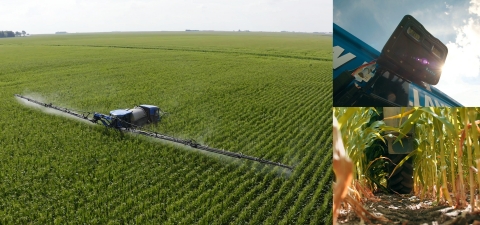Raven Accelerates Autonomous Solutions, Advances VSN® Guidance Technology
Raven Accelerates Autonomous Solutions, Advances VSN® Guidance Technology
Full Canopy Guidance & Automatic Row Turnaround Eliminate Human Error
SIOUX FALLS, S.D.--(BUSINESS WIRE)--Raven Industries, Inc. (the Company; NASDAQ:RAVN) announced today two advancements for its market-leading VSN® Visual Guidance System, building upon the Company’s bold investment in Raven Autonomy™. The latest advancements in VSN — full canopy guidance and automatic row turnaround — allow operators to cover more acres with less worry.
VSN is the only technology of its kind available to ag retailers and growers today. With these advancements, the visual guidance system:
- Allows the operator to cover 20 percent more acres due to increased speed and ease of use.
- Reduces driver fatigue, allowing operators to increase the average length of their work day.
- Practically eliminates crop damage and misapplication in the field, which can cost growers yield and profit of up to 2 percent.
- Pays for itself within the first year of use.
VSN’s new advancements are Raven’s latest step towards a fully-autonomous solution. By freeing the driver from steering, this patent-pending technology allows operators to focus on all other aspects of effective application control. The latest advancements in VSN will help operators confidently and accurately operate machinery in additional types and stages of crop.
Full Canopy Guidance
The first advancement utilizes non-contact radar sensors to guide the machine in full canopy crop. This proactive approach is not dependent on mechanical mechanisms and precisely steers the machine at speeds exceeding 18 mph. This first-to-market, non-contact, multi-sensor approach maintains sub-inch accuracy through varying crop conditions.
Automatic Row Turnaround
The second advancement, to be released in fall 2020, will automatically turn the machine around in headlands at each end of a planted field. This technology warns the operator to slow down, begins the turn, automatically finds the next set of rows, and accurately turns and steers the machine down the next pass. In addition to reducing operator fatigue even further, this complementary technology will also eliminate missed rows, crop damage and overspray.
“When driving in tasseled corn, I’m usually worried about how much I’m potentially going to run down — but the VSN has taken the human error completely out of it,” said Dave Nelson, grower from Fort Dodge, IA. “By taking away the steering aspect, [VSN] has given me the ability to watch the machine and watch what I’m doing, even coming into the end rows.”
“The latest advancements from VSN are part of our bold and strategic investment in autonomous solutions for agriculture,” said Brian Meyer, Vice President of Raven Applied Technology. “VSN provides ag retailers and growers with a semi-autonomous solution proven to eliminate crop damage. Ag retailers utilizing the technology are experiencing increased and consistent performance, reduced crop damage claims and improved labor retention.”
The VSN full canopy solution is available today with commercial release in fall 2020. Ag retailers or growers interested in the product can request a demo on https://ravenprecision.com/vsn. Automatic turnaround capabilities are scheduled to be available fall 2020.
About Raven Industries, Inc.
Raven Industries (NASDAQ: RAVN) is dedicated to providing innovative, high-value products and solutions that solve great challenges throughout the world. Raven is a leader in precision agriculture, high-performance specialty films, and lighter-than-air technologies. Since 1956, Raven has designed, produced, and delivered exceptional solutions, earning the company a reputation for innovation, product quality, high performance, and unmatched service. For more information, visit https://ravenind.com.
About Raven Applied Technology
Raven Applied Technology is helping feed a growing population by delivering impactful technology that improve agricultural efficiency for custom applicators and growers around the world. From field computers to sprayer and planter controls, GPS guidance steering systems, wireless and logistics technology, Raven provides precision agriculture products and solutions designed to reduce operating costs and improve yields.
Contacts
Jared Stearns, Investor Relations Manager
Raven Industries
+1 (605) 336-2750
jared.stearns@ravenind.com
Lisa McElrath, Communications Manager
Raven Industries
+1 (605) 336-2750
lisa.mcelrath@ravenind.com
